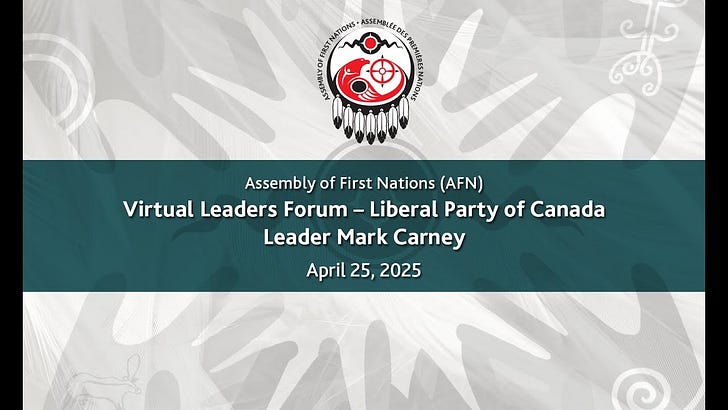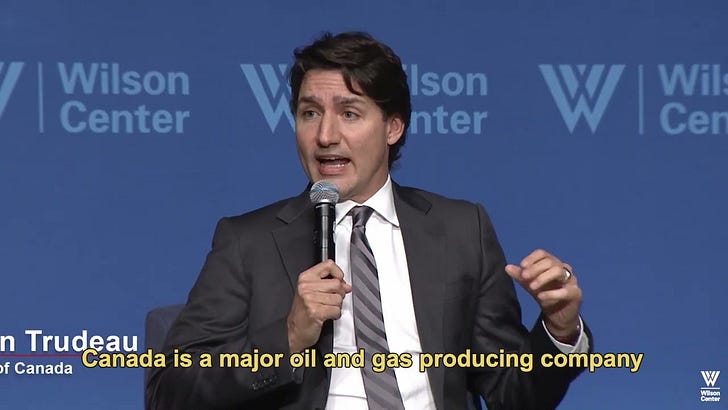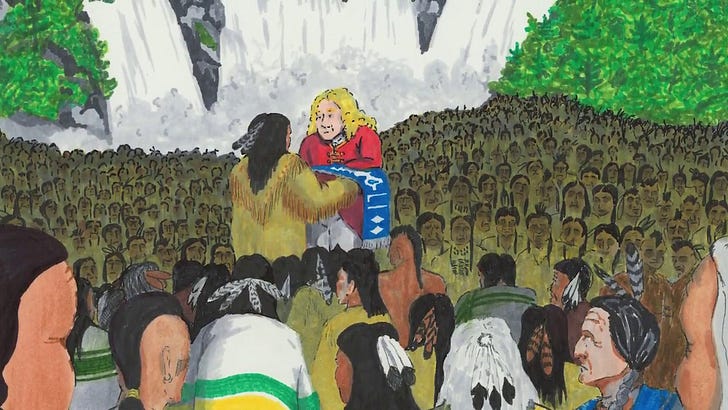Thoughts from the AFN forum with CPC leader Pierre Poilievre.
I have been wondering if I should offer comments on these interviews and the “answers” the party leaders gave. If you have aspects of these interviews you wish to discuss, please make a comment (or restack with a note).
The fact I am starting with one party leader should not be seen as an endorsement of any other leader or party. I may have a ranking of them, and consider some worse than others, but I don’t endorse any of these parties or their “leaders”.
AFN Virtual Forum Series with Federal Party Leaders (Election 2025)
AFN hosted a series of conversations with Canadian Federal Party Leaders. See their YouTube channel if you want to view other videos, including the French translations.
For what might be obvious reasons, I watched the interview of Pierre Poilievre first as he has been the most vocal settler-colonial thinker of any of the leaders. He exists within the Reform branch of the Conservative Party of Canada (active since he was 16), with the Reform Party growing out of Western Canadian alienation based on the unique ways that Alberta, Saskatchewan and Manitoba were created.
The Reform Party is in many ways a regional party similar to the Bloc Quebecois, but they ran candidates in other regions. Due to vote splitting caused by not ranking ballots, Reform carried out a hostile takeover of the historical Progressive Conservative Party.
(Note: I was a supporter of David Orchard, voted for him in the 1998 leadership campaign, and I consider Peter MacKay to be a traitor to his party and country).
(Note: That article discusses more than Alternate Vote, but more importantly on how parties form, merge, and potentially split. I also have been watching Canada moving closer and closer to being like the USA and its two-party system narrowly focused on the executive branch of government.)
It was a mixed bag from Poilievre, even if you were willing to take him at his word. I don't think he even recognizes his assimilationist language, discussing the Canadian wage economy and never discussing the self-sufficient National economies of First Nations. He regularly got the band-council vs Nation aspect wrong, but that is typical Canadian misunderstandings (which, as I regularly admit, I was clueless about most of my life).
He did say some good things, such as how the Dominion of Canada continues to maintain government branches (not all in “Ottawa” as Poilievre kept claiming) that extract quite a bit of resources that would be better to simply transfer to First Nations governance. That will sound appealing, if again people feel comfortable taking him at his word.
Poilievre kept making weird comments such as, “We want to make First Nations the Wealthiest people in the world".
Did he mean LandBack or CashBack? If you don’t know what that is about, you can read Yellowhead Institute Red Papers on the topic.
I have no reason to believe he is even aware of these concepts, and that he didn’t mean returning anything of what Canada already owes. It felt to me that he was discussing dropping off a few pennies to those who were made deliberately poor by Canadian policies as a bribe for them to agree to further multi-generation debt in the form of resource extraction projects that never get cleaned up by Canada.
I think it is helpful to spend some time on what I thought was his most embarrassing answer. He was asked about the Natural Resources Acts, and deflected the question by claiming he needed to do some research.
(Jump to 54:02)
It is impossible he did not already know about these Acts given his Reform Party roots , and the historical grievances generated by the Alberta and Saskatchewan Acts of 1905, and the Natural Resources Transfer Acts.
The Natural Resources Transfer Acts of 1930 were formally passed into law with the British North America Act 1930.
These acts are based on the myth that the Dominion of Canada purchased land from the Hudson's Bay Company in 1870, but that company didn’t own land – only an exclusive patent from the British Crown to do business in a region without competition from other European companies.
The claim that these "provinces" were equal partners entering Confederation is false. British Columbia doesn't have treaties, in violation of The Royal Proclamation 1763, which should have made that government ineligible for entry. Alberta, Saskatchewan, and Manitoba were created by the Canadian Crown (federal government) out of parts of what was then called the North Western Territories. Which again, Canada didn’t own – it made treaties to share land with existing Nations.
These were not British colonies that entered into confederation as was the case with New Brunswick, Nova Scotia and the colony of “Canada” that was split into Ontario and Quebec, or even the colony of Newfoundland that was forced into confederation in 1949.
While Steven Harper, also from the Reform branch of the Conservative Party famously claimed that Canada has no history of colonialism, he was correct only in the meaning that we don’t talk about “history” when discussing current events. The westward and northward expansion of the Dominion of Canada into what it called the Northwestern Territories was all colonialism by the Dominion of Canada, and that has not ended.
This is a perfect question to focus on, as it exposes some of the myths that Canadians tell themselves. Treaties are with the British Crown, and some with the Canadian crown, but none are with a Provincial crown. While Canada may have jurisdictional separation between different federal and provincial crowns that are extremely different from how other nations organize themselves, those divisions don’t relate to Treaty relationships with other nations. Just as Quebec is not a Nation, Alberta isn’t either. These regions of the Dominion of Canada may have distinct cultures, but in the case of the Nations that existed here before subjects of European Monarchies started to visit they are actual Nations in the same way that Britain, France, Spain and other European Nations are Nations.
The relationships are Nation to Nation, and Canadian provinces are not nations. Contrary to all the White nationalist separatists, provinces can’t separate from the Canadian Crown and become nations.
Whether it is Jordon’s Principle or other policies where Canada wants to violate treaties and try to dump treaty obligations onto provinces, the same is true when talking about natural resources. The Dominion of Canada can only delegate to provinces things which are under the exclusive jurisdiction of Canada, which does not apply to land and Indigenous peoples which some falsely believe is the exclusive jurisdiction of Canadian governments.







